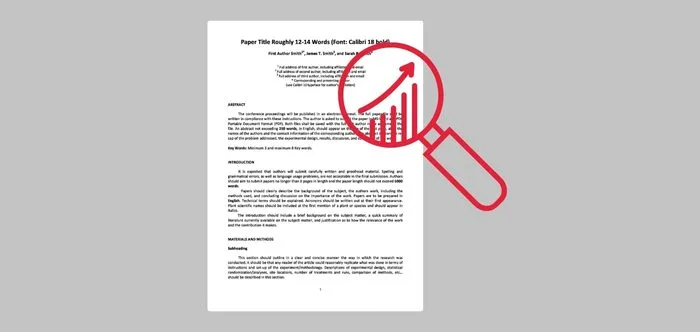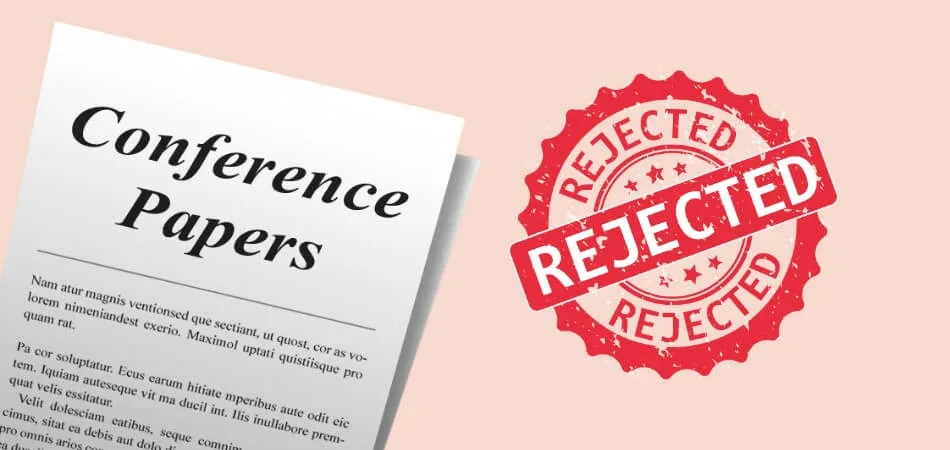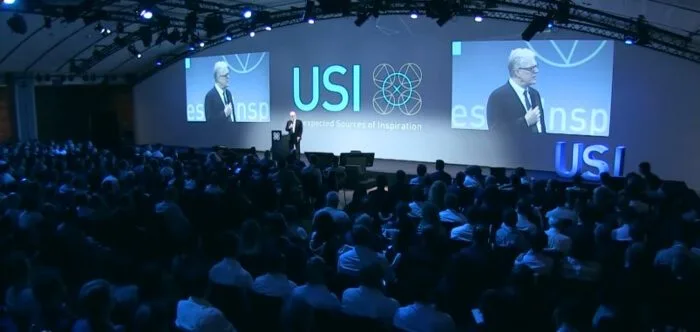In academic and professional conferences, the acceptance of papers is a crucial step towards sharing knowledge and research. But a common question arises: Why are papers rejected in conferences?
The primary reason lies in the lack of originality and novelty in the research presented. If a paper fails to introduce new or meaningful insights to its field, its chances of acceptance diminish significantly. This stems from the conference committees’ high standards for innovation and contribution to the academic discourse.
To overcome this challenge, researchers are advised to conduct a thorough literature review, ensuring their work stands out in the sea of submissions. Continue reading to explore more about this topic and learn how to increase your paper’s chances of acceptance.
Research Paper in Conferences – A Quick Overview
Research papers at conferences serve as a pivotal means for scholars to disseminate their findings and engage with the academic community. These papers typically consist of concise summaries of the author’s research, methodology, results, and conclusions. They are subject to rigorous peer review processes to ensure quality and relevance.
Conferences offer an opportunity for researchers to present their work to a diverse audience, fostering discussions and collaborations. Each paper undergoes a meticulous selection process, often starting with the submission of an abstract, followed by a thorough evaluation by experts in the field. Accepted papers are then presented during conference sessions, allowing authors to showcase their work and receive feedback from peers.
Moreover, conferences provide a platform for networking and staying updated on the latest developments in one’s area of study. Attending conferences not only aids in knowledge exchange but also enhances a researcher’s visibility and credibility within the academic community. Overall, research papers at conferences are instrumental in advancing knowledge, fostering connections, and driving innovation in various fields.
Types of Research Papers You Can Present at the Conference
Taking part in a conference is an exhilarating experience, offering a platform to showcase diverse research papers. Each type carries its unique significance and approach, catering to varied academic interests. Let’s dive into the different types you might encounter.
Empirical Studies
Empirical studies are grounded in data and observations, often used in scientific fields. Researchers present findings from experiments or surveys, offering tangible, data-driven insights. These papers are crucial for advancing practical knowledge and testing theoretical frameworks.
Literature Reviews
Literature reviews merge existing research on a specific topic. They provide a comprehensive overview, identifying trends, gaps, and future research opportunities. This type helps in understanding the current state of knowledge and its evolution over time.
Case Studies
Case studies focus on a detailed analysis of a particular instance or event. They offer in-depth insights into real-world applications of theories. These papers are valuable for understanding complex issues in a contextualized setting.
Theoretical Papers
Theoretical papers dive into abstract concepts, proposing new theories or models. They stimulate academic debate and encourage the re-examination of existing ideas. This type is essential for the conceptual evolution of a discipline.
Methodological Papers
Methodological papers discuss new or improved research methods. They contribute to the refinement of data collection and analysis techniques. These papers are vital for enhancing the accuracy and efficiency of research processes.
Position Papers
Position papers present an argument or viewpoint on a controversial issue. They are often thought-provoking, aiming to persuade or open dialogue. This type is crucial for stimulating intellectual discourse and reflection within the academic community.
The diversity of research papers at conferences reflects the dynamic and multifaceted nature of academic inquiry. Whether it’s data-driven empirical research or a compelling theoretical argument, each type contributes uniquely to the tapestry of knowledge.
Why Are Papers Rejected in Conferences?
When submitting papers to conferences, rejection can be a common yet disheartening outcome. Understanding the reasons behind these rejections can be invaluable for researchers. Let’s explore the key factors that often lead to paper rejections at conferences.
Lack of Originality
A major reason for rejection is the paper’s lack of originality. If the research doesn’t introduce new ideas or perspectives, it may not be considered valuable. Conferences seek innovative contributions that advance the field. Repetitive or derivative work often fails to meet this criterion.
Insufficient Literature Review
An inadequate literature review can lead to rejection. It’s vital to show awareness of existing work in the field. Papers that ignore previous research risk repeating known facts. A thorough literature review demonstrates understanding and context.
Flawed Methodology
Papers may be rejected due to methodological weaknesses. Flaws in research design, data collection, or analysis impact credibility. A clear, logical, and well-executed methodology is essential for acceptance. Errors or inconsistencies in methodology are often deal-breakers for conference committees.
Poorly Written or Structured
A well-written paper is crucial for conveying research effectively. Poor grammar, unclear language, or disorganized structure lead to misunderstandings. Clarity and coherence are as important as the content itself. A poorly presented paper undermines the quality of research.
Lack of Relevance
Relevance to the conference theme is key. Papers outside the scope of the conference’s focus are likely rejected. It’s important to align your research with the conference’s interests. Papers should contribute meaningfully to the overarching topic of the conference.
Incomplete or Incorrect Submissions
Finally, technicalities matter. Incomplete submissions or failure to adhere to submission guidelines result in rejection. Attention to detail in following the conference’s format and submission procedures is crucial. Neglecting these aspects can disqualify even the most promising research.
Understanding these common pitfalls can significantly improve the chances of your paper being accepted at a conference. It’s not just about the quality of your research, but also how you present and align it with the conference’s expectations.
What to Do If a Paper is Rejected?
Facing paper rejection can be disheartening, but it’s a common part of the academic journey. It’s crucial to use this as a learning opportunity and a stepping stone for improvement. Here’s what you can do if your paper gets rejected.
- Review the feedback carefully. Understand the reasons for rejection to address specific issues in your paper.
- Don’t rush to resubmit. Take time to thoroughly revise and strengthen your paper based on the given feedback.
- Consider seeking advice. Discuss the feedback with colleagues or mentors for additional perspectives and guidance.
- Look for alternative conferences or journals. Different platforms might be more suited to the theme and scope of your paper.
- Work on improving your writing and presentation. Enhance clarity and structure to ensure your research is communicated effectively.
- Stay updated with current research trends. Align your work more closely with the latest developments and demands in your field.
- Remember, rejection is not the end. Use it as a motivator to refine and enhance your research and academic skills.
In academic research, persistence and resilience are key. Rejection is not a failure but a chance to learn, improve, and succeed in future submissions.
Essential Tips to Properly Submit Your Research Paper in a Conference
Presenting a research paper at a conference can be a crucial moment in an academic career. To increase the likelihood of acceptance, it’s crucial to understand the submission process. Here are essential tips to help guide you through this important task.
Know the Conference Theme
Ensure your paper aligns with the conference’s theme. Research topics that resonate with the conference focus stand a better chance of acceptance. Tailoring your paper to fit the theme shows your commitment to contributing meaningfully. Ignoring the theme can lead to immediate rejection, regardless of your paper’s quality.
Follow Submission Guidelines
Adhering to the conference’s submission guidelines is critical. These guidelines include formatting, word count, and specific submission procedures. Neglecting these details can lead to outright rejection. Always double-check your submission against these requirements before sending.
Craft a Compelling Abstract
Your abstract is the first thing reviewers will see. It should succinctly summarize your research while capturing the essence of your work. A well-crafted abstract piques interest and sets the tone. Ensure it’s clear, concise, and reflective of your paper’s content.
Ensure Originality and Relevance
Originality and relevance are key to getting noticed. Your paper should present new insights or approaches to the field. It’s essential to demonstrate how your research contributes to existing knowledge. Papers lacking originality or relevance are often overlooked.
Focus on Quality Writing
Quality writing is non-negotiable. Your paper should be well-structured, clear, and free of grammatical errors. A well-written paper enhances readability and conveys professionalism. Poorly written submissions can undermine even the most innovative research.
Seek Feedback Before Submission
Before submitting, get feedback from peers or mentors. Constructive criticism can significantly improve your paper. Feedback helps identify weaknesses you might have overlooked. Use this input to refine and strengthen your submission.
Submitting a research paper to a conference requires careful preparation and attention to detail. By following these tips, you can enhance your paper’s chances of acceptance. Remember, each submission is a learning opportunity and a step forward in your academic journey.
Bottom Line
In essence, managing conference submissions is a crucial skill in the academic world. The journey begins with understanding the unique demands and expectations of these forums.
Central to this understanding is grasping why are papers rejected in conferences. The answer often lies in the originality and relevance of the research, its alignment with the conference theme, and adherence to submission guidelines. Mastering these aspects is key to success.
Accepting rejection as a learning tool rather than a setback can significantly enhance a researcher’s journey. With persistence and attention to detail, researchers can increase their chances of acceptance and make impactful contributions to their field.








